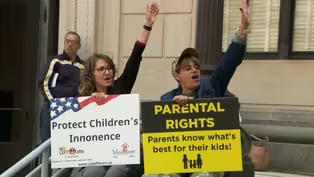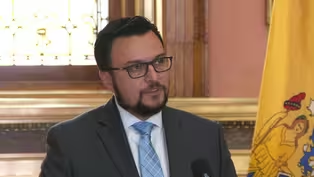NJ Spotlight News
Feds loosen ban on blood donations from gay men
Clip: 5/15/2023 | 5m 37sVideo has Closed Captions
Interview: Perry Halkitis, dean of the Rutgers School of Public Health
Federal regulators last week relaxed rules that have for decades effectively banned men who have sex with men from donating blood in the United States. Advocates from the LGBTQ+ community have praised the move for stepping away from a discriminatory policy rooted in the anti-gay stigma that took root after the AIDS epidemic broke out.
Problems playing video? | Closed Captioning Feedback
Problems playing video? | Closed Captioning Feedback
NJ Spotlight News is a local public television program presented by THIRTEEN PBS
NJ Spotlight News
Feds loosen ban on blood donations from gay men
Clip: 5/15/2023 | 5m 37sVideo has Closed Captions
Federal regulators last week relaxed rules that have for decades effectively banned men who have sex with men from donating blood in the United States. Advocates from the LGBTQ+ community have praised the move for stepping away from a discriminatory policy rooted in the anti-gay stigma that took root after the AIDS epidemic broke out.
Problems playing video? | Closed Captioning Feedback
How to Watch NJ Spotlight News
NJ Spotlight News is available to stream on pbs.org and the free PBS App, available on iPhone, Apple TV, Android TV, Android smartphones, Amazon Fire TV, Amazon Fire Tablet, Roku, Samsung Smart TV, and Vizio.
Providing Support for PBS.org
Learn Moreabout PBS online sponsorshipthe Food and Drug Administration is officially easing restrictions that'll allow more gay and bisexual men to donate blood the federal agency says it'll now recommend an individual risk-based survey for all donors regardless of their sexual orientation it ends a policy that began in the 1980s designed to protect the blood supply from HIV by fully Banning men who have sex with other men from donating critics have long said the guidelines were discriminatory the rule was updated twice during the last several years but still included limits requiring those individuals to abstain from sexual contact for certain periods of time before giving blood for more context I'm joined by Dr Perry helkidis dean of the Rutger School of Public Health who spent decades researching HIV and the AIDS epidemic this is a long awaited announcement what does this mean as a whole both for the community lgbtq and just for the need for blood which we've seen a shortage as of late so Brianna I think first and foremost we know there's a blood shortage in the United States right so we should be able to get blood from any person who's able to give blood and so this uh change in policy or this recommendation for this change in policy is is welcomed in that regard but here's what it means also for like gay men and bisexual men for like 40 years gay bisexual men have been prevented from donating blood in any meaningful way it has uh created a level of stigma and discrimination for a community that quite frankly has done a really good job at managing HIV now what it also does is it makes blood donation about behavior and not about a person's characteristics so can you imagine if we had a policy in the United States that said oh you cannot donate blood because you're Asian or you cannot donate blood because you're a woman we would not tolerate that but what this new policy does is look if you're a person who's potentially at risk sexually because you've had multiple partners or you have a new partner and you don't know that person that person's status and by partner I mean sexual partners then we we have to reconsider you for blood donation and that doesn't matter if you're gay bi straight queer any of those identities make no difference it's about Behavior so that is an advancement that aligns perfectly with science well and it's interesting right because for years the American Medical Association has said um that this limit on the donors wasn't necessary that proper screening exists of course it was put in place back in the early days of the AIDS epidemic and yet the FDA was slow to make this new recommendation why was that was it discriminatory as you're saying well I think you know the result of that the timing the slowness the sluggishness of the FDA is just an indication of historic artifact around the HIV epidemic and for if for those of us who are old enough to remember this disease AIDS was called Grid at first gay related immune deficiency and so over the course of the last 40 years that stigma that name that blame hasn't really gone away so the FDA realizes the political environment that it's in it realizes that there's a generation of people who still think about AIDS as a gay disease and it had to be really thoughtful in rolling this out so while I have you know I wish it was faster I do have some compassion for the FDA and the political forces they have to face in order to be able to make these decisions um and yet very quickly Dr halkidas there are still some parameters around folks who take the medication called prep what are those and do you expect to see changes that will be more inclusive for those folks as well look I'm going to take this announcement this decision this step forward as an incredibly important stuff you don't get everything all at once in life right you get it in increments like even when we think about handling any disease like covet we had masks we had we had one vaccine we had another vaccine if you make you take small steps forward to improve so the problem with uh the policy right now according to some activists is that it excludes individuals who are HIV negative who are taking a drug called Truvada or a drug called discovery which is used for pre-exposure prophylaxis pre-exposure prophylaxis means you take one antiviral once a day to prevent you from acquiring HIV the concern is that taking those medications May mask an infection and so you know it is a cautious step but I don't think should be the one caveat that we let us that stops us from moving forward so we'll get to that point eventually let's take this huge leap right now and um and honor it and be grateful that it's actually happened finally all right Dr Perry helkitas for us thank you so much for joining me always an honor to be with you Bri support for the medical report is provided by Horizon Blue Cross Blue Shield of New Jersey an independent licensee of the Blue Cross and Blue Shield Association
Child care struggling to return to pre-pandemic levels
Video has Closed Captions
Clip: 5/15/2023 | 4m 3s | Fewer children present on top of less staff (4m 3s)
Conservatives rally for parental rights in school policies
Video has Closed Captions
Clip: 5/15/2023 | 4m 24s | State House rally drew conservatives and parents to speak passionately about their mission (4m 24s)
Federal investigation of Menendez continues
Video has Closed Captions
Clip: 5/15/2023 | 1m 8s | Another round of federal subpoenas were served late last week (1m 8s)
Michael Noriega nominated by Murphy for NJ Supreme Court
Video has Closed Captions
Clip: 5/15/2023 | 4m 5s | If confirmed, Noriega would be the third Hispanic member in history (4m 5s)
WGA members picket outside Maplewood high school
Video has Closed Captions
Clip: 5/15/2023 | 4m 24s | Some say the strike has no end in sight (4m 24s)
Providing Support for PBS.org
Learn Moreabout PBS online sponsorship
- News and Public Affairs

Top journalists deliver compelling original analysis of the hour's headlines.

- News and Public Affairs

FRONTLINE is investigative journalism that questions, explains and changes our world.












Support for PBS provided by:
NJ Spotlight News is a local public television program presented by THIRTEEN PBS




